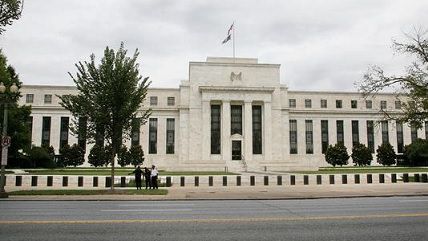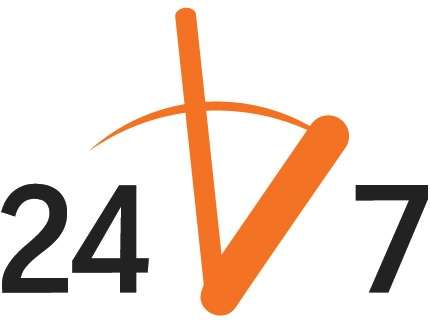Federal Reserve's US Debt Holding Hits Record $2 Trillion
$2,001,093,000,000 as of Aug. 14


Since the financial crisis of 2008, the Federal Reserve has filled its balance sheet with private assets and public debt through instruments like quantitative easing, and the totals are adding up.
The Federal Reserve's holdings of publicly traded U.S. Treasury securities—federal government debt—pushed above $2 trillion for the first time last week, hitting approximately $2,001,093,000,000 as of Aug. 14, according to the Fed's latest weekly accounting.
The Fed's accounting for the previous week showed that it had owned approximately $1,993,375,000,000 in U.S. Treasury securities as of Aug. 7.
Back on Dec. 31, 2008, before the Fed began its strategy of "Quantitative Easing," the Fed owned only $475.9 billion in U.S. Treasury securities. Since then, the Fed's holdings of U.S. government debt have more than quadrupled.
"And nothing else happened."
Follow this story and more at Reason 24/7 and don't forget you can e-mail stories to us at 24_7@reason.com and tweet us at @reason247.
Editor's Note: As of February 29, 2024, commenting privileges on reason.com posts are limited to Reason Plus subscribers. Past commenters are grandfathered in for a temporary period. Subscribe here to preserve your ability to comment. Your Reason Plus subscription also gives you an ad-free version of reason.com, along with full access to the digital edition and archives of Reason magazine. We request that comments be civil and on-topic. We do not moderate or assume any responsibility for comments, which are owned by the readers who post them. Comments do not represent the views of reason.com or Reason Foundation. We reserve the right to delete any comment and ban commenters for any reason at any time. Comments may only be edited within 5 minutes of posting. Report abuses.
Please to post comments


Two Trillion Dollars and all I got was this lousy t-shirt.
I didn't get a shirt.
What I do have, however, are Federal Reserve comic books. If you click on any of the listed titles, then click "view," you can see them in PDF form. I have the actual print comic books.
Now that I think about it, I'm very surprised Hit & Run has never done a post on these comic books, which cover the following topics:
The Story of Banks
The Story of Foreign Trade and Exchange
The Story of Monetary Policy
The Story of the Federal Reserve System
Too Much, Too Little
Wishes & Rainbows
I wish I could conceive of what that number actually represents. Or maybe I don't.
It represents the market price for any large state.
I have the same issue. I get the feeling that this is an even bigger accounting gimmick than the SS Lock Box.
I still don't get why we aren't hyper-inflating.
I still don't get why we aren't hyper-inflating.
Maybe this?
http://research.stlouisfed.org.....s/EXCRESNS
Because the velocity of money cratered. So despite quadrupling M0, M2 has only been rising at 5-10% per year.
Annual Change in M2, aka, the real inflation rate.
This is one of the reasons we aren't hyper-inflating. Sure we've printed a lot of money over the last 5 years, but a lot of it is sitting in big accounts or moving between big accounts, rather than being used to employ people or purchase real things.
Also credit creation has slowed dramatically. Credit is as good as money, so that counteracts the money creation. There was a destruction of wealth too.
Hyper-inflation doesn't seem likely, but I wouldn't rule out 70's inflation as we move further down the road.
My go-to quote for these sorts of things:
- Richard Feynman
So will Justify survive Elmore Leonard's passing?
It might, if you actually got the name right.
I made an effort to not fuck up the author's name and still blew it 😉
That was Bernanke's plan all along and he's an expert on the Great Depression so obviously this is a good thing and exit strategy etc etc.
We're rich.
RICH, I tell you!
Wealthy beyond our wildest dreams.
I'm watching a lecture series on Amazon Instant Prime about the decline and fall of Rome. Lots of talk about economics. While there are plenty of areas we don't parallel the Romans, there are some troubling similarities, like out-of-control spending, welfare galore, and stagnation.
They tried to build a wall too.
They did have quite a few problems with illegal immigrants.
Did you ever read the book "American Theocracy"?
Ignore the title and look at the parallels the author draws between the US and almost every other empire in human history. It's like cyclical or something.
By Kevin Phillips? He also wrote one called "bad money" write before the credit crisis. The paperback came out after and had a scathing forward directed at Paulson and Bernanke. Had similar themes to American Theocracy. I read "wealth and democracy too" which was not as good.
A lot had to do with tax policy. Rome rose with free ports that took business away from Crete, and fell with high taxes needed to support the legions, which meant the barbarians to the north and the Muslims to the south could move in with lower tax alternatives that were embraced by those populations (who also thought not being killed sounded good, too). See the book I am always pimping around here: For Good and Evil by Charles Adams.
It is funny how quickly the Left has moved to the belief that inflation is some creature from a bygone era with no relevance to today. Many advocate that we continue to monetize our national debt indefinitely, some with cute tricks such as the trillion-dollar platinum coin. Most of them are too young to remember the 1970s.
We've reached the stage that we are already spending all that people are willing to pay in taxes, so we are to the "beg, borrow, or print" stage of government finance. Those on the left who are educated enough to realize you can't just print money forever as the government's main source of financing are playing a long con, where by the time inflation becomes a problem they can point to all the entrenched entitlement programs that we 'have no choice' but to fund, so taxes will just have to go up.
I was astonished that anyone took the trillion-dollar platinum coin idea seriously. It's like a little test to determine if someone understands how fiat money works.
The Fed is doing two things:
(1) Suppressing interest rates by manipulating the Treasury market. The $2T in Treasuries that the Fed holds on its books is only part of the manipulation. Its also making cash available to its member banks essentially for free, which they also use to buy Treasuries to "shore up their balance sheet". Its all debt monetization, which always and everywhere leads to pretty severe inflation.
(2) Taking garbage assets (in the form of CMOs) off its member's books. This is a form of preemptive bailout, make no mistake, that will be paid for later by the public at large when the distortion this creates works its way out. Probably via inflation, possibly through some other channel.
Bernanke's superstitious fear of deflation is leading him to buy assets at above market in order to keep those markets propped up. What happens when he has to realize the true value of the crap he's buying (either when interest finally breaks free of his manipulation or he has to write down those CMOs), I have no idea. But it can't be pretty, and will likely take the form of an over-correction for his manipulation.
There is not a shred of evidence that member banks are using overnight loans to shore up their balance sheets.
Buffett just loaned BoA $5 billion at 6% plus a boatload of warrants.
RC Dean mentioned overnight loans exactly never.
Banks buying Treasuries like crazy:
http://www.bloomberg.com/news/.....hases.html
This is attributed to the banks having to do something with all those deposits that they aren't using to support lending.
But ask yourself this: if the banks really have all this cash that they have nothing else to do with, why are they hitting the discount window at all?
All is well!
Keep Calm and Carry On!
Nothing to see here, folks.
http://www.reuters.com/article.....M920130819
Tangential:
Richmond will declare a house that sold for $1M as 'blight' to pull of the eminent domain scam:
"Pricey homes in Richmond's eminent domain plan"
"Point Richmond: Sold for $1.195 million. Loan balance: $888,361. City's offer: $510,727. Estimated value: $666,461. Photo: Brant Ward, The Chronicle "
http://www.sfgate.com/business.....745146.php
Un-frigging-believable.
2 Trillion Dollars is Enough Money to:
1. Launch 1724 Saturn V rockets.
2. At an average cost of $2.72 million per mile, it is enough to contruct 735,294 miles of rural highway, over 3 times the distance between the Earth and the Moon.
3. Manufacture 1,481,481 Tiger I tanks, which, assuming a fairly lavish equipping regime, would be enough to equip 3,704 Panzer Divisions.
4. Purchase 50 million pounds of Blue Meth from Heisenberg.
5. Buy 18 million BMW M6 coupes at full sticker price. This is almost enough to give one free car to every college student in America.
Wait, what?
That's actually at the low end, Auric. FTA:
I imagine the price has gone up a bit since 1996.
Here's Florida's ostensible cost per mile for road construction and maintenance.
My god. It's a bit of tar!
+1 eight lane monolith.
What happens when he has to realize the true value of the crap he's buying
No kidding; is the Fed required to mark to market? When (not if) interest rates rise, there will be a severe drop in the value of the Treasury debt on the books.
Treasury rates are already rising.
How is velocity of money down? Isn't government immediately spending the $85 billion created by the Fed each month? The first spender of inflated money gets the bargain and others down the chain get the eventually inflated prices. Is velocity down because the second
recipient is putting the revenue in its bank account instead of spending it?